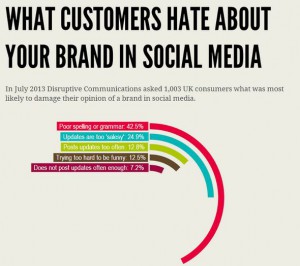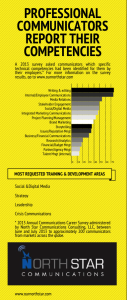Today, over on Shel Holtz’s blog we learn that customers don’t like spelling and grammar mistakes. According to one survey in the UK, poor spelling and grammar are the transgressions most likely to damage consumer opinion of a brand in social media.

The survey notes that 42.5% of consumers do not like brands in social media who use poor spelling or grammar. Among the other findings:
- “Nearly 25% said posts and updates are too salesy.
- Nearly 13% said posting too often was an irritant (although 7.2% didn’t like brands that failed to post often enough).
- All those tweets brands send out in an attempt to be funny? Trying too hard to provoke a chuckle rankles 12.5% of respondents.”

At the same time, Mark Dollin’s shared the results of his 2013 Communications Competency Study. Guess what the top competency or skill for most improvement was? Writing and Editing at 75%.
That is followed by improvements to:
- Internal/Employee Communications (74%);
- Media relations (54%);
- Stakeholder engagement (49%): and,
- Social/digital media (49%).
Now, before we touch on the social media aspect of these surveys, let’s just pause to note something. Whether it is social media, media relations, corporate communications in other forms or marketing—the basics matter. You don’t want your story told by typos.
In the “Disruptive Communications” study Shel references, it is likely not surprising that “salesy” and “cutesy” are not big winners for social media content. It’s why utility, usefulness and things that matter to customers are the underpinning for successful social content strategies. Stories, usefulness, connections are what build relationships. Think about your own relationships. Were they built on you selling your friendship or authenticity and connection?
What is a little surprising about Mark’s survey is that expertise or social media competency is not higher on the list for communication managers. Brand marketing and story telling are also further down the list for Communications leaders than I would have expected.
This is especially surprising when contrasted with the finding that employees in agencies or corporate communications functions identify social media training and development as where they need the most support. Social and digital media is identified as the number-one need by employees, followed by strategic planning and leadership.
As you may know, my view is that social communications really does require some pretty fundamental changes to the strategy and tactics of public relations, not to negate the continuing value of writing well.
I could suggest that some communications leaders have yet to truly understand that social media communications is actually quite different and requires different strategies than traditional media and “push” communications. It is also more measurable, and I would argue, can have a more sustaining impact on company reputations and brands, in all kinds of ways. Maybe these leaders simply think social media means traditional media relations in a new “venue”? Add to these considerations, the speed of change and developments in social media — one has to be surprised that keeping abreast of those rapid changes, in itself, might be a reason to constantly upgrade social media skills?
On the other hand, perhaps communications staff are seeing there is a difference in day-to-day “social” connections with influencers, customers or other stakeholders important to a business. These day-to-day experiences may be raising questions among staff about the traditional practice of PR but given their leaders focus on pushing that company position, no one is stopping to think through the strategies, skills and opportunities to really measure new and deliver the value that comes with direct public relationships?
I don’t have the data to support those thoughts. Its speculation from some things I have seen.
Why do you think these is such a disconnect between what managers think about social media expertise and employees? Do you have experiences or thoughts to explain this discrepancy?
(Note/Disclosure: To be transparent, Mark Dollins, Shel Holtz and I are partners in SME², a first of its kind consultancy. SME² is a framework we established to measure more than 30 different social media skills and competencies across an organization. We map those skills against the business’ social strategy; identify strengths, weaknesses and opportunities; and, help clients determine the best path forward– based on the robust data and analytics that come from this process)